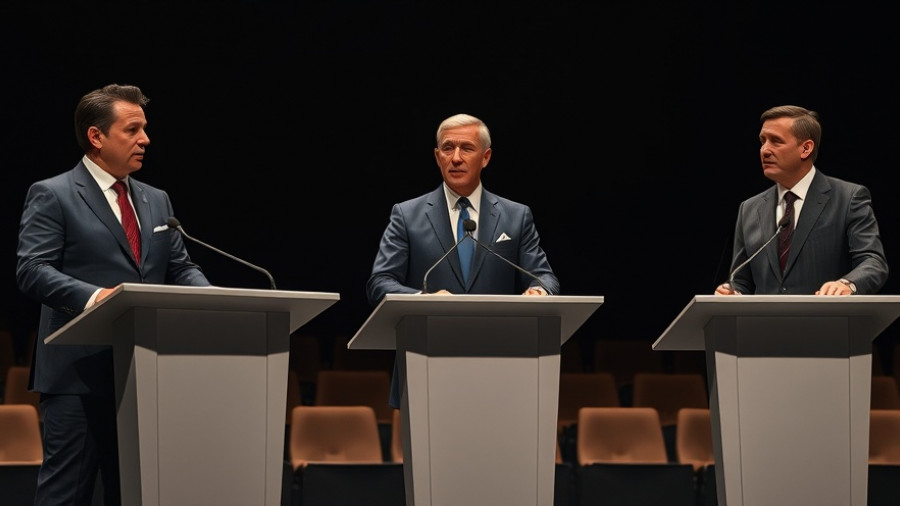
Debate Highlights: Politicians Bring Their Best Zingers
In a tense clash that brought New York City politics to the forefront, Democratic nominee Zohran Mamdani, former Governor Andrew Cuomo, and Republican Curtis Sliwa took center stage for the final mayoral debate before the pivotal November elections. The atmosphere was electric as they traded barbs on issues ranging from affordability to accusations of harboring dangerous ideologies, with each candidates’ track records under intense scrutiny.
Mamdani’s Vision vs. Cuomo’s Experience
Mamdani, the current polling front-runner, positioned himself as the progressive candidate offering a vision for an inclusive and affordable city. "I am the sole candidate running with a vision for the future of this city," he affirmed, presenting ideas for universal childcare and rent freezes as pillars of his campaign. In stark contrast, Cuomo lashed out, questioning the 34-year-old's experience and dubbing him as someone who merely talks big without the knowledge or capability to enact real change. This dynamic created a narrative where experience clashed vehemently with youthful idealism.
The Trump Factor: Allies and Enemies
The specter of Donald Trump loomed large over the debate, complicating the candidates’ interactions. Cuomo, often criticized for sharing donors with the former president, accused Mamdani of being Trump’s puppet while Mamdani countered that Cuomo's caliber was insufficient to lead in the current political landscape: "You could turn on the TV any day of the week, and you will hear Donald Trump share that his pick for mayor is Andrew Cuomo." This exchange not only highlighted their political relations but also tapped into broader concerns about the influence of national politics on local issues.
Raising Important Questions About Equality
Discussions about Mamdani’s policies for the Palestinian cause and accusations of anti-Semitism epitomized the heated debate over identity politics that is resonating throughout the election. Cuomo seized on the controversy, claiming that Mamdani's positions "stoked the flames of hatred against Jewish people." Mamdani defended himself staunchly, declaring, "I will be the mayor who doesn’t just protect Jewish New Yorkers, but also celebrates and cherishes them." The exchanges underscored the necessity for respectful discourse around sensitive issues in a city as diverse as New York.
Unpacking the Policies: Where Do They Stand?
Both Mamdani and Cuomo faced stern questioning about their policies and plans, including Mamdani's ambitious proposals for universal free public buses and rent freezes. Sliwa, rising above the fray, attempted to inject a sense of practicality into the conversation by accusing his opponents of living in fantasy land regarding their feasibility. As the debate turned to pressing topics like homelessness and housing, the tension escalated into a back-and-forth that showcased each candidate’s strengths and weaknesses.
Emotional Appeals and Personal Attacks
At times, the debate veered into personal territory. Mamdani not only confronted Cuomo about the sexual harassment allegations that led to his resignation from the governor’s office but also brought the audience’s attention to one of his accusers present in the room, raising the stakes, and sparking heated exchanges. As Mamdani probed, "What do you say to the 13 women who you sexually harassed?" Cuomo pushed back defensively, creating an emotional undercurrent that resonated with voters concerned about integrity in leadership.
The Future of New York Politics
As the night concluded with no clear endorsements for a presidential candidate in 2028, the atmosphere reflected both uncertainty and readiness for change. Voters will have to make their choice between the established power in Cuomo and the transformative vision offered by Mamdani, with Sliwa promising an alternative for conservatives.
What’s Next for New York City?
As election day approaches, the stakes are high. The rhetoric of the candidates serves not only to define their individual platforms but also shapes the broader narrative of New York City’s future. With early voting set to commence on October 25, and the election on November 4, the debates have set the stage for one of the most pivotal elections the city has faced in years. Stay informed and engaged as the unfolding drama of NYC politics reveals the sentiments and priorities of its diverse population.
 Add Row
Add Row  Add
Add 




Write A Comment